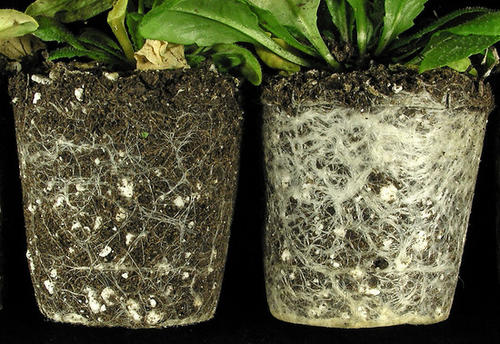Strengthening Plants at the Roots
Developmental biologists at Freie Universität have developed plants with roots that accumulate more minerals in the sprout and are more resistant to drought.
Mar 24, 2011
Changing the hormone balance of plants can promote the growth of a more intensive root system. The root system of the wild-type Arabidopsis plant (left) compared with the root system of the modified Arabidopsis plant (right).
Image Credit: Tomáš Werner / DCPS
Plants that need less fertilizer, plants that can thrive even with less water and bring high yields – plant researchers and growers have been working toward this goal for a long time, indeed long before global climate change became noticeable. Researchers at the Dahlem Centre of Plant Sciences, a focus area at Freie Universität Berlin, have now succeeded in specifically modifying the growth of plants’ roots so that the plants are better able to exploit nutrients in the soil and to withstand dry periods.
Roots are vital to a plant’s survival: They absorb water and nutrients from the soil, help store substances the plant needs, anchor it securely to the earth, and allow it to come into contact with other life forms under the ground. It isn’t easy, however, for researchers to work with a plant’s roots, since their underground location makes them very difficult to access for analysis. As a result, much less is known about the processes that take place within a plant’s roots than about what happens above the ground, in its green shoots.
Developmental biologists working under the leadership of Professor Thomas Schmülling and junior professor Tomáš Werner within the Institute of Applied Genetics at Freie Universität have now succeeded in showing that the plant hormone cytokinin performs key functions in regulating root growth. In a publication in the highly regarded journal Plant Cell, the researchers describe how to produce plants that form a reinforced root system. They were able to achieve this by deliberately reducing the concentration of cytokinin in the roots. This is the first time that intervention in a plant’s hormonal system has succeeded in specifically stimulating root growth in entire plants. The team showed that plants that have been modified in this way accumulate more minerals in the sprout and are more resistant to drought.
The results of the research, which were achieved using model plants, could be highly significant for use in agriculture. Lack of water and nutrients is the main factor that limits plant growth and yields in the fields. Nutrients such as phosphate and nitrate that are vitally necessary to plant growth have to be supplemented through fertilization. This is energy-intensive and costly and has adverse environmental effects such as eutrophication (excessive fertilization) of waterways. About 75 percent of the world’s freshwater supply goes toward agricultural production of plants. Optimizing the root system of crops could be an important factor in making agriculture less resource-intensive, and thus more sustainable.
In a research group at the Dahlem Centre of Plant Sciences, developmental and molecular biologists are now working together with ecologists to study what effects increased root growth has on the interaction between plants and other life forms in the soil. Thomas Schmülling heads up an international consortium looking at the topic, with partners in Germany, France, and Spain. As part of the collaborative research project “ROOT – Root enhancement for crop improvement,” the researchers are studying whether the results of fundamental research can be applied to regulating the root architecture of crops, and what the economic and ecological benefits of the desired improvements will be. The project is receiving funding of 1.5 million euros in total from the German Federal Ministry of Education and Research (BMBF) for an initial term of three years as part of international research into the plant genome.
Further Information
- Prof. Thomas Schmülling, Institute of Biology
Tel.: +49 (0)30 / 838-55808, Email: tschmue@zedat.fu-berlin.de - Prof. Tomáš Werner, Institute of Biology
Tel.: +49 (0)30 / 838-56796, Email: tower@zedat.fu-berlin.de

